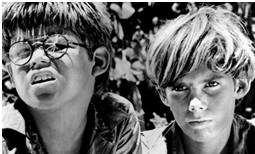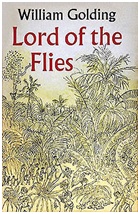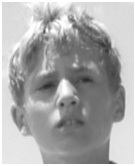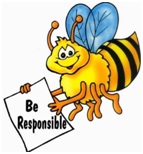|
 |
|
 |
|
|
||
Lord of the Flies - Leadership
Lord of the Flies (1954)
Written by the Englishman, William Golding (1911-93), pictured right. His naval service in the Second World War convinced him that people are naturally evil, the book’s main message.
Fun facts
Key characters A group of boys including Jack, Ralph, Piggy, Roger and Simon
The story A large number of evacuated English boys, aged 7 to 12, are stranded on a tropical island after their plane is shot down during a war. Amongst them are Ralph, Simon and Piggy who
support responsibility and morality. Jack and Roger are evil and ambitious egomaniacs. Ralph and Piggy (pictured right in the film) discover a special conch shell, which Ralph blows to call all the boys onto the beach. Ralph is elected their leader and appoints Jack to lead the group hunting for food. Roger is given responsibility for keeping the signal fire alight. But they become so obsessed with killing pigs that the fire goes out, missing a passing ship and leading to a row between:
Jack and his group (including Roger) are cruel bullies. They taunt and hurt the little children (known as “littluns”). The children are also troubled by nightmares and the frightening idea that a beast hides in the sea and comes out at night. This fear increases when two boys think they see the beast, when actually it is the silhouette of a dead fighter pilot’s parachute. Ralph and Jack are now bitter rivals and more and more boys are joining Jack’s less civilized group, which violently kills and decapitates a pig. Only Simon knows that the dead pig's head (the Lord of the Flies) represents the evil within the boys. Then Simon discovers the dead parachutist and realizes that this is the beast and rushes off to tell
the others. In the rain Jack’s group mistake him for the beast, brutally kill him and (the next day) steal Piggy’s glasses to light a fire. Ralph and his few supporters demand them back. But they are attacked and Piggy is killed by Roger and his glasses and the conch shell are smashed. Ralph, now alone, just manages to escape and hides in the forest, hunted by the others who want to kill him. Weeping because of the evil in people’s hearts, Ralph is rescued by a British naval ship which sees the fire.
Lessons for leadership
1. Dictatorship can be destructive Dictator Jack, is evil, killing Simon and Piggy and destroying the:
Jack wins over the boys’ support, because they see his evil savagery as more fun.
2. People can be evil (but don’t give up hope) The murderous tyranny of Jack and his followers triumphs over goodness, democracy and intelligence (personified by Simon, Ralph and Piggy). Evil (which Simon says is in everyone) crushes Ralph’s attempt to lead through compassion and consent. . The book shows that mankind constantly lives on a knife edge between civilization and savagery. 3. Treasure the truth Jack (pictured right in the film) fools people by saying he wants to “do the right thing” and does the opposite. The myth of the beast also shows how easily people can believe the unbelievable, encouraged by evil and manipulative leaders like Jack. The Christ-like Simon sacrifices his life telling the boys the truth about the beast.
4. Know yourself The boys’ belief in the beast stops them:
They disastrously fail to:
5. Fear is fatal Fear of the imaginary beast leads to Simon’s savage murder. Piggy (pictured right in the film) believes that science has the answer to fear and superstition.
6. Goodness doesn’t guarantee greatness Ralph is a good person, but he fails as a leader because he is:
Despite the unpopularity it brings him, Piggy is constantly reminding the others of:
7. Concentrate on what’s important Unlike Jack, Piggy realizes the importance of the:
8. Don’t stop learning Piggy’s wisdom comes from academic knowledge. Simon relies on intuition and Ralph learns from experience, particularly people’s potential for evil. Piggy’s glasses are a symbol of
Ralph’s leadership is destroyed when he loses the will to fight for Piggy’s principles after Piggy dies.
9. Unity is vital The boys are strongest when they are united under Ralph’s leadership, but his rivalry with Jack weakens them irreparably. 10. Put thought into positive action Simon (pictured right in the film) :
Ralph isn’t so reflective and his leadership suffers because of it. “If only one had time to think!”, he laments.
Key quotes on ethics Ralph wept for the end of innocence, the darkness of man’s heart. Maybe it’s only us, Simon (on people’s innate evil)
Key quote on bureaucracy Bollocks to the rules, Jack
Two literature websites to recommend 1. sparknotes.com 2. litcharts.com
|
|
|
||
|
|
||
| Copyright © wisdomtowin.com 2025 All Rights Reserved | ||
|











